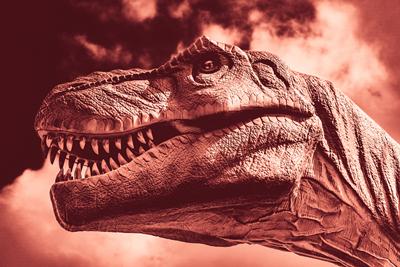It was the asteroid impact, not volcanic eruptions, that killed the dinosaurs

Volcanic activity did not play a direct role in the mass extinction event that killed the dinosaurs and about 75% of Earth’s species 66 million years ago, according to a team involving University of Southampton researchers.
Two planetary-scale disturbances occurred within a million years of one another, leading scientists to question the role each played in driving the mass extinction event.
For this new study, the researchers searched for evidence of a correlation in timings between volcanic eruptions and the extinction event but found none.
66 Million years ago, an asteroid collided with the Yucatan Peninsula in Mexico leaving a 200km wide crater. Close to this time, 500,000 cubic kilometres of lava flooded across much of India ending up in the sea and forming the Deccan Traps- one of the largest volcanic features of Earth.
The study, led by Yale University, analysed marine fossils and climate models to investigate whether the major release of volcanic gasses contributed to the extinction. They found this happened 200,000 years before the asteroid, ruling out volcanic activity as the cause.
Professor Paul Wilson of the University of Southampton led the International Ocean Discovery Program expedition which recovered the marine sediments the research is based on. He said: “There’s been a big row about the cause of the mass extinction for decades. The demise of the dinosaurs was the iconic event but they were large animals and there weren’t really that many of them so it’s tough to use them to figure out the cause.
“We studied microscopic marine organisms called foraminifera and there are thousands of them in a teaspoon-full of ocean sediment. To get them we drilled into the sea bed in waters nearly 5km deep not far from the watery grave of RMS Titanic off the coast of Newfoundland using a sort of geology time machine - a drill ship called the JOIDES Resolution run by one the world’s most successful international scientific collaborations, the International Ocean Discovery Program.”
Co-author Professor Paul Bown from UCL added. “Most scientists acknowledge that the last, and best-known, mass extinction event occurred after a large asteroid slammed into Earth 66 million years ago, but some researchers suggested volcanic activity might have played a big role too and we’ve shown that is not the case,”
By analysing deep sea sediment sections drilled from the North Atlantic, Pacific and South Atlantic Oceans, the researchers found that volcanic activity in the Late Cretaceous period caused only a gradual global warming of about two degrees, but this had no significant effect on marine ecosystems, and cooler conditions had returned prior to the extinction.
“A lot of people have speculated that volcanoes mattered to the event, and we’re saying, ‘No, they didn’t,’” said study lead author, Dr Celli Hull from Yale.
“Recent work on the Deccan Traps have also pointed to massive eruptions immediately after the mass extinction. These results have puzzled scientists because there is no warming event to match. Our study suggests that the global carbon cycle was so altered by the extinction event that the ocean was able to absorb much greater amounts of CO2, perhaps hiding the warming effects of volcanism in the aftermath of the event.”
Researchers from UCL, the University of Southampton, University of Edinburgh and the Open University form part of a multinational team of scientists that drilled and studied a new section in the North Atlantic through the NERC-funded Integrated Ocean Drilling Program Expedition 342.
The wider team includes researchers from institutions in Germany, France, Spain, Japan, Denmark and the USA.